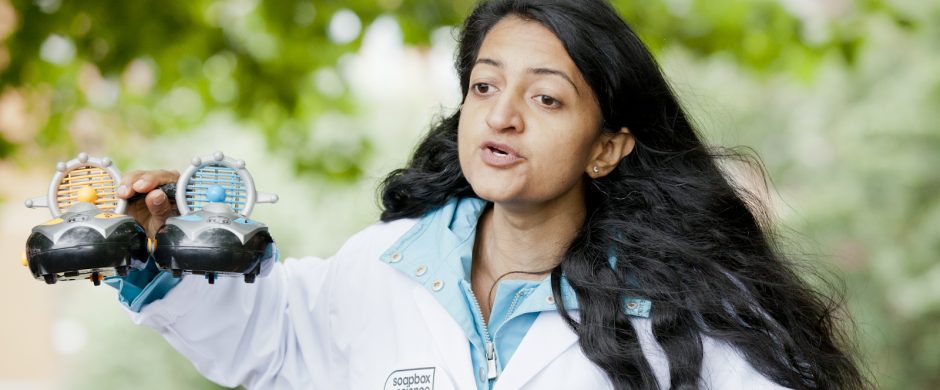 Stacy Phillips (@shtacy_phillips) is a 1st year PhD student at The Open University, Milton Keynes. Stacy is a geologist and geochemist who is investigating granites in the Himalaya, trying to find out how these rocks formed and what that can tell us about how the Himalayan mountain chain came to be. This is a photo of her carrying out fieldwork in May 2017 in eastern Bhutan. Come along to her Soapbox Science talk in Milton Keynes on 29th July 2017 to find out “How to make a mountain”.
Stacy Phillips (@shtacy_phillips) is a 1st year PhD student at The Open University, Milton Keynes. Stacy is a geologist and geochemist who is investigating granites in the Himalaya, trying to find out how these rocks formed and what that can tell us about how the Himalayan mountain chain came to be. This is a photo of her carrying out fieldwork in May 2017 in eastern Bhutan. Come along to her Soapbox Science talk in Milton Keynes on 29th July 2017 to find out “How to make a mountain”.
SS: Stacy, how did you get to your current position?
SP: After doing my BSc. at the University of St Andrews I ended up on the other side of the Atlantic studying for my MSc. at Memorial University of Newfoundland, where I was looking at the formation of granites in the Mojave Desert, California. I returned to the UK and worked as a Data Analyst, monitoring petrol tanks for leaks, but the call to research was too strong to ignore and I applied for a fantastic project at The Open University, where I started in October 2016.
SS: What, or who, inspired you to get a career in science?
SP: I’m a naturally curious person so I’ve always been attracted to science. Understanding the natural processes that shape our landscape initially drove me towards physical geography. I was then lucky enough to go to a college that taught A-Level Geology, and it was that course that got me hooked! And then it was during my undergraduate studies that I found out about all the weird and wonderful places you can travel being a geologist and I knew that it was the career for me.
SS: What is the most fascinating aspect of your research/work?
SP: I find it incredible that I can take a fist-sized sample of rock, crush it down into fine pieces, extract tiny minerals that are smaller than a grain of sand, look at the chemistry of those minerals and be able to understand how an entire mountain belt forms. Being able to investigate processes across all of those scales is pretty mind-blowing really!
SS: What attracted you to Soapbox Science in the first place?
SP: I love talking about my work, partly so I can drop into the conversation that I’ve been to the Himalaya! But mainly I enjoy the challenge of convincing people that rocks are cool an interesting! I want people to feel as passionately about geology as I do. I also think that geology can come across as a bit dry and unimportant to the general public. But in reality, if you can’t grow something you have to dig that material up out of the ground, so if we’re using the earth’s natural resources then rocks should be really important to the general public. And that is a point I hope I can get across from atop my soapbox.
SS: Sum up in one word your expectations for the day
SP: Excitement (+ a tinge of fear!)
SS: If you could change one thing about the scientific culture right now, what would it be?
SP: The prospect of having to work in a “Publish or Perish” culture where papers are the currency is really daunting. I know that in order to have a chance of getting a post-doc I’m going to need to have published by the time I finish my PhD. Although this would obviously be the goal anyway, the pressure is going to start very early on my career, and is only going to get worse as (or if!) I progress.
SS: What would be your top recommendation to a woman studying for a PhD and considering pursuing a career in academia or research?
SP: I don’t have anything specific to women, as gender shouldn’t matter in academia (although unfortunately it often still does). But my advice to anyone pursuing research is to try for everything that you can, just give it a go! A funding proposal, a training opportunity, job applications, you just have to go for it. Even if you think you’re underqualified or you won’t get it, what is the harm in trying? You definitely won’t get it if you don’t try at all. I’ve had my fair share of rejections for jobs and positions already, but I kept going and eventually I ended up landing my dream project. Give yourself the chance and who knows where it might take you! The Himalayan mountains maybe?!
